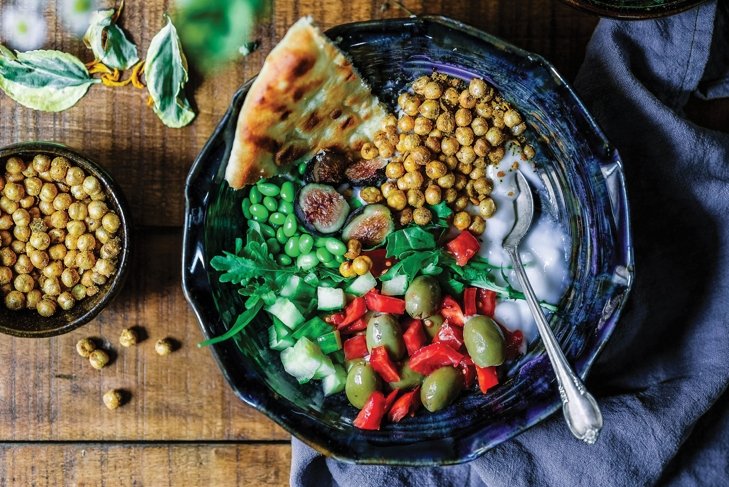
The time for New Year’s resolutions has come and gone, but September presents another occasion to start something new. Choosing a new goal is the exciting part, but sticking to it takes commitment. Here’s how to make seven fresh starts.
With the leaves turning sumptuous shades of red and orange and kids toddling off to school, are you also craving a new beginning? Read on for seven ways you can carve out a new niche and learn how to support these new ambitions.
Commit to a fitness regimen
Exercise is renowned for aiding in weight control, reining in many health conditions and disease, lifting mood, and helping with sleep. Establishing a fitness routine in the fall can also be an enjoyable experience, says Janis Isaman, movement specialist and nutrition coach, and the owner of Calgary-based My Body Couture.
“It can be fun to follow some of the same rituals you did as a child [going] and buy some new gear—water bottle, pair of pants, and definitely some new running shoes,” suggests Isaman.
Isaman also suggests
- Start your workout regimen when other fall routines are also beginning. Don’t wait for anything—such as your kids’ activities—to kick off or you’ll risk a long delay in getting started.
- Work out with a friend or co-worker; you’ll be more likely to stick to your routine, and studies show you’ll also work out longer.
- Focus on activities you love—not the latest trends.
Supplemental support
To help sustain your fitness goals, Isaman prefers vegan protein powders (made from ingredients such as hemp or peas) because they offer meat eaters an alternative protein source. Fermented vegan protein is also available for an easy-to-digest protein powder that also supports gut health.
Go vegan
Vegans refrain from eating animal-based products (including honey). Not only is veganism environmentally friendly and ethical, but it can also be healthy. Going vegan may lower your risk of type 2 diabetes and decrease blood pressure and body mass index (BMI).
Veganism isn’t just about dropping meat, asserts registered holistic nutritionist—and vegan—Eileen Fauster. Fauster encourages newbies to the diet to visit a professional nutritionist for help with tweaking their dietary habits.
“Being vegan does not make you healthy, just like being a carnivore does not make you unhealthy,” says Fauster.
Fauster also suggests sampling a variety of dishes at your local vegan restaurant to inspire your homemade meals.
Supplemental support
As there are no reliable natural plant-based sources of the vitamin B12, you’ll need to supplement. A B12 deficiency can result in anemia, which can cause serious side effects.

Head back to school
Whether you want to keep your skills fresh or pursue a new career, you may find yourself hitting the books this year.
Jane Stoller, Vancouver-based author of the book Organizing for Your Lifestyle (BookBaby, 2016) has developed some tips to stay sane while studying.
Stoller suggests
- Block out calendar space for various activities such as family time and study time.
- Combine activities for efficiency. For example, you could turn workouts into fun family time.
- Delegate within your family, or by outsourcing: you can even contract out your emailing.
If you’re keen on learning more about health and nutrition, check out the alive Academy. The Academy is an accredited distance education program offering courses on a range of topics, from vegan nutrition to herbology or biology, along with diploma programs such as the Sports & Fitness Nutrition Certificate Program or Applied Nutrition. (Find out more at aliveacademy.com.)
Supplemental support
To keep your noggin nourished, snack on beans: they’ll give your brain a steady supply of glucose. Also, get sufficient B vitamins for energy and healthy brain function.
Prep to send your child back to school
By keeping kids in close quarters, schools become breeding grounds for childhood bugs. To help keep children germ free, encourage them to keep their hands washed. Instruct your child to lather up while singing “Happy Birthday”—twice. Remind them to wash up before eating and after using the toilet, blowing their nose, coughing, or sneezing.
Lice also spreads swiftly among children. Take preventive steps by instructing your child to avoid head-to-head contact with other kids, not to share personal belongings such as hats and scarves, and avoid storing items such as coats in shared spaces, including hooks or lockers.
To keep kids strong and healthy, well-balanced meals full of carbohydrates and proteins pack nutritional punch. A specially formulated children’s multivitamin/mineral can also provide insurance.
Circumvent stress
In the short term, stress can cause low energy, headaches, and upset stomach; in the long run, it can cause or worsen mental health issues, cardiovascular disease, and obesity.
Meditation and yoga can make your worries wilt. In one study, participants felt greater stress resilience and well-being following a three-month meditation and yoga retreat. To get started, enroll in a yoga class (try Hatha or Iyengar, styles best suited to beginners) or download a meditation app (such as Headspace or Stop, Breathe & Think).
When you need a mood boost, reach for complex carbs: chewing on whole grain bread, pasta, oatmeal, or other complex carbs will create a steady uptick in serotonin levels. Chomping on raw veggies may also tame tension by releasing the stress in your jaw. Lavender aromatherapy has also been known to soothe stress.
Supplemental support
- A broad-spectrum vitamin B formula can help to ease feelings of stress.
- Vitamins C and E are powerful antioxidants that also help in stress reduction and system support.
- Magnesium and omega-3 fatty acids boost the nervous and immune systems—both of which are depleted during stress.
- Adaptogenic herbs to support adrenal function, such as ginseng, licorice root, or Ginkgo biloba, are recommended as well.
Make a meal plan
Plotting out your meals saves time, money, and your health! According to registered dietitian Pamela Fergusson, meal planning should take less than two hours each week. For some unique and über-healthy recipes to help cut down on busy mealtime prep, check out “Batch Play” on page 88 and “Beautiful Bowlfuls” on page 98.
Fergusson advocates a flexible approach to meal planning. She suggests planning for two to three main dishes to last the week and focusing on dishes that are easily transformed. For example, you could serve chili with quinoa on the first day. The next day, make salsa and guacamole and use the leftover chili in tacos.
Also, perform time-consuming tasks, such as chopping veggies, on weekends. Try roasting whole squash and scooping out the flesh for curries and soups, or pre-bake sweet potatoes for Buddha bowls or salads.
Slumber soundly
Getting a good night’s rest boosts learning, decision making, and creativity. On the other hand, a sleep shortage can lead to an increased risk of heart disease, diabetes, and stroke, as well as decreased immunity. Lack of sleep even tampers with your appetite: it interferes with leptin production, a hormone that helps your body recognize you’re full.
To get your shut-eye back on track, start by keeping regular bed and wake-up times, and do not deviate more than an hour between days to maintain your sleep/wake cycle. Sleep for the recommended seven hours minimum, and keep your bedroom cool, dark, and quiet.
Supplemental support
- Melatonin, the hormone you naturally produce before sleep, can help re-establish your sleep/wake cycle.
- Valerian is thought to mildly increase the amount of calming chemicals in the brain.
- Camomile calms the mind and soothes the nervous system.
- Tryptophan, found in warm milk, nuts and seeds, bananas, honey, and cereal, may also lull you to sleep. Be careful: a small snack could send you drifting into dreamland, but a heavier meal may just leave you lying awake.





